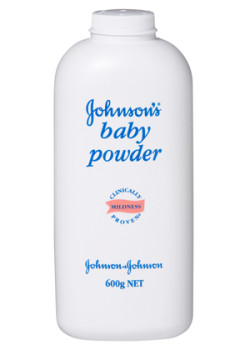 Talcum powder is a popular choice for many women for feminine hygiene. However, this common household product may be responsible for causing ovarian cancer in thousands of women each year.
Talcum powder is a popular choice for many women for feminine hygiene. However, this common household product may be responsible for causing ovarian cancer in thousands of women each year.
The link between Johnson &Johnson’sbaby powder and ovarian cancer dates back as early as 1971, when a study of ovarian cancer patients revealed talc particles in their ovarian tissues.
However, Johnson & Johnson has argued against these findings and managed to keep the product on the shelves for 40 more years without restriction or warnings of any kind.
Talcum Powder and Ovarian Cancer
Talc is a mineral comprised primarily of magnesium, silicon, and oxygen. When ground into powder, talc can absorb moisture and reduce friction. Talcum powder is widely used to help keep skin dry and prevent rashes.
When used on the genitals, however, dangerous talc particles can travel into the ovaries and remain trapped for years. These particles can cause inflammation and lead to the growth of ovarian cancer cells.
Research suggests that talcum powder can contribute to cancer in the ovaries if particles enter the body through the vagina. One review of data reported in the medical journal Cancer Prevention Research indicated that women who regularly use talc-based powder for feminine hygiene might increase their risk of ovarian cancer by about 41 percent.
Following the 1971 study, numerous studies were published pointing to the link between talc and ovarian cancer. In 1992, a study found that regular use of baby powder increased the risk of developing ovarian cancer threefold. In 2010, a Harvard study concluded that talc in baby powder was carcinogenic to humans.
Yet talcum powder remains on the market unregulated and without any warning from the manufacturer.
Failure to Warn of Ovarian Cancer Risk
Despite numerous studies that pointed to the connection between talc and ovarian cancer, neither Johnson & Johnson nor the FDA has ever warned American consumers of the risks.
Even though the Department of Health and Human Services has concluded that regular baby powder application leads to higher rates of ovarian cancer, Johnson & Johnson continues to deny the connections and the risks.
Baby Powder Cancer Lawsuits
Luckily, judges and juries are not in agreement with the FDA or Johnson & Johnson. The first baby powder cancer lawsuit was recently won in 2013 when a federal jury recently found that talcum contained in some Johnson & Johnson powders contributed to a woman’s ovarian cancer.
The plaintiff in this case was diagnosed with ovarian cancer in 2006, after about 30 years of using talcum-based Johnson & Johnson powders, including the popular Shower-to-Shower body powder, as part of her personal hygiene routine.
The jury found that Johnson & Johnson failed to warn consumers of a link between the use of talc-based powder for feminine hygiene and a heightened risk of ovarian cancer.
This outcome gives hope to the thousands of women who have developed ovarian cancer after using talc-based products. If you or a family member was diagnosed with ovarian cancer after using a talcum-based Johnson & Johnson powder product, such as Shower to Shower or Johnson’s Baby Powder, for feminine hygiene, you may be entitled to compensation for your pain and suffering.
Do YOU have a legal claim? Fill out the form on this page now for a free, immediate, and confidential case evaluation. The attorneys who work with Top Class Actions will contact you if you qualify to let you know if an individual lawsuit or class action lawsuit is best for you. [In general, baby powder cancer lawsuits are filed individually by each plaintiff and are not class actions.] Hurry — statutes of limitations may apply.
ATTORNEY ADVERTISING
Top Class Actions is a Proud Member of the American Bar Association
LEGAL INFORMATION IS NOT LEGAL ADVICE
Top Class Actions Legal Statement
©2008 – 2025 Top Class Actions® LLC
Various Trademarks held by their respective owners
This website is not intended for viewing or usage by European Union citizens.
Get Help – It’s Free
Join a Free Baby Powder Cancer Class Action Lawsuit Investigation
If you used Johnson’s Baby Powder, Shower to Shower, or another talcum powder product and were diagnosed with ovarian cancer, you may have a legal claim. Family members of loved ones who died of ovarian cancer can also join. Submit your information now for a free case evaluation.
An attorney will contact you if you qualify to discuss the details of your potential case at no charge to you.












